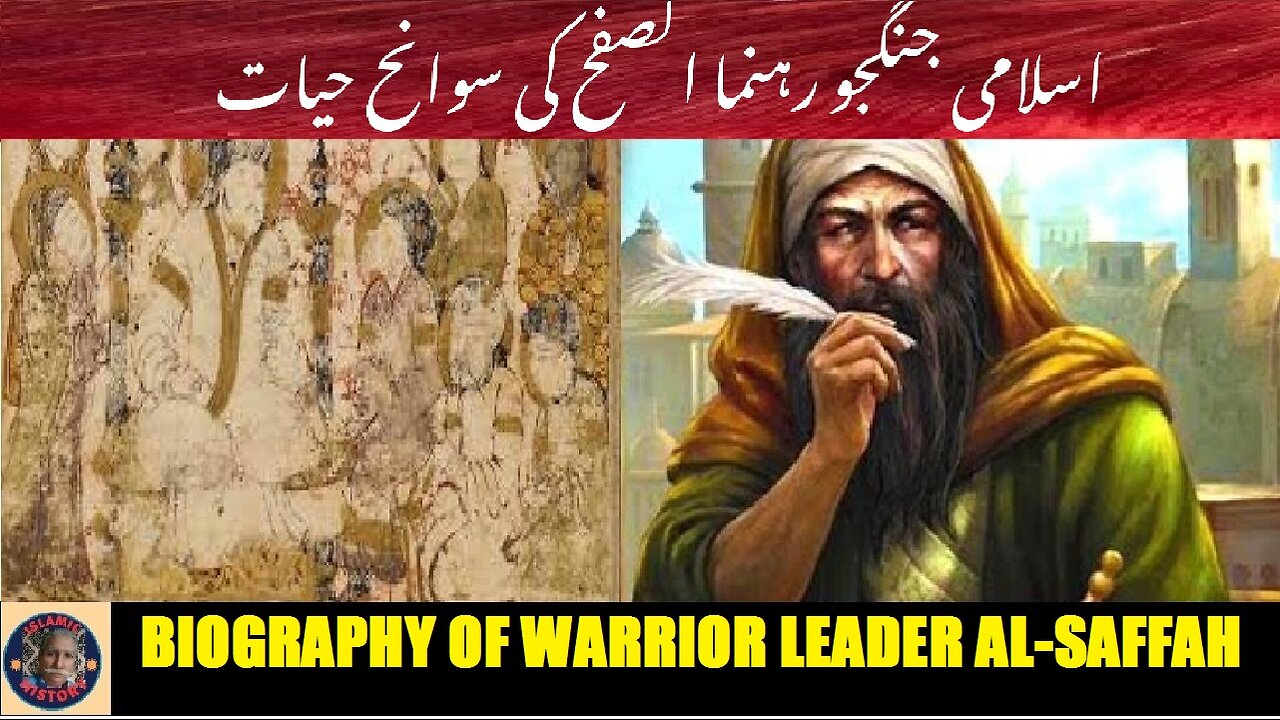Premium Only Content

Biogrphy of Islamic Warrior leader al-Saffah | اسلامی جنگجو رہنما الصفح کی سوانح حیات
@islamichistory813 #WarriorLeader #IslamicCaliphate #HistoricalBiography
Biogrphy of Islamic Warrior leader al-Saffah
Dekhti Aankhooon aur sountay kaanoon ko Asslamoalaikum, sisters, brothers friends and elders, This video presents a comprehensive biography of al-Saffah, the renowned Islamic warrior leader and founder of the Abbasid caliphate. Describing the key events that shaped his leadership, his military conquests, and the cultural transformations that occurred under his rule. Gain insights into how al-Saffah's vision and determination laid the groundwork for one of the most influential dynasties in Islamic history.
Abu al-Abbas Abd Allah ibn Muhammad ibn Ali ibn Abd Allah ibn al-Abbas known by his laqab al-Saffah was the first caliph of the Abbasid Caliphate, one of the longest and most important caliphates in Islamic history.
His laqab al-Saffah means "the Blood-Shedder". It may refer to his ruthless tactics, or perhaps it was used to instill fear in his enemies.
As-Saffah, born in Humeima (modern-day Jordan), was head of one branch of the Banu Hashim from Arabia, a subclan of the Quraysh tribe who traced its lineage to H?shim, a great-grandfather of Muhammad via 'Abbas, an uncle of Muhammad, hence the title "Abbasid" for his descendants' caliphate. This indirect link to Muhammad's larger clan formed sufficient basis for as-Saffah's claim to the title caliph.
As-Saffah was the son of Muhammad ibn Ali and his mother, Rayta, was the daughter of a certain Ubayd Allah ibn Abd Allah.
As narrated in many hadith, many believed that in the end times a great leader or mahdi would appear from the family of Muhammad, to which Ali belonged, who would deliver Islam from corrupt leadership. The half-hearted policies of the late Umayyads to tolerate non-Arab Muslims and Shi'as had failed to quell unrest among these minorities.
During the reign of late Umayyad Caliph Hisham ibn Abd al-Malik this unrest led to a revolt in Kufa in southern Iraq, mainly by the town's slaves. Shi'ites revolted in 736 and held the city until 740, led by Zayd ibn Ali, a grandson of Husayn and another member of the Banu Hashim. Zayd's rebellion was put down by Umayyad armies in 740. The revolt in Kufa indicated both the strength of the Umayyads and the growing unrest in the Muslim world.
During the last days of the Umayyad caliphate, Abu al-‘Abbas and his clan chose to begin their rebellion in Khurasan, an important, but remote military region comprising eastern Iran, southern parts of the modern Central Asian republics of Turkmenistan, Uzbekistan, Tajikistan, Kyrgyzstan and northern Afghanistan. In 743, the death of the Umayyad Caliph Hisham provoked a rebellion in the east. Abu al-`Abb?s, supported by Shi'as and the residents of Khurasan, led his forces to victory over the Umayyads. The civil war was marked by millennial prophecies encouraged by the beliefs of some Shi'as that as-Saff?? was the mahdi. In Shi'ite works such as the al-Jafr faithful Muslims were told that the brutal civil war was the great conflict between good and evil. The choice of the Umayyads to enter battle with white flags and the Abbasids to enter with black encouraged such theories. The color white, however, was regarded in much of Persia as a sign of mourning.
In early October 749 (132 AH), Abu al-'Abbas as-Saffah's rebel army entered Kufa, a major Muslim center in Southern Iraq. As-Saffah had not been yet declared caliph. One of his priorities was to eliminate his Umayyad rival, caliph Marwan II. The latter was defeated in February 750 at a battle on the (Great) Zab river north of Baghdad, effectively ending the Umayyad caliphate, which had ruled since 661 AD. Marwan II fled back to Damascus, which didn't welcome him, and was ultimately killed on the run in Egypt that August. As-Saffah would go on to become the first Abbasid caliph, but he did not come forward to receive the pledge of allegiance from the people until after the Umayyad caliph[5] and a large number of his princes were already killed.
In one far-reaching, historic decision, as-Saff?h established Kufa as the new capital of the caliphate, ending the dominance of Damascus in the Islamic political world, and Iraq would now become the seat of 'Abbassid power for many centuries.
So sisters brothers friends and elders, tomorow we are going to described Why and how Al-Saffah killed Umayyad family?. Allah hafiz
=======================================
-
 7:30
7:30
ISLAMIC HISTORY
11 hours agoIslamic History Episode 216 The murder of Fadl bin Sahl फदल बिन सहल की हत्या قتل فضل بن سہل
3 -
 LIVE
LIVE
Rallied
2 hours ago $0.76 earnedWarzone Solo Challenges
384 watching -
 57:40
57:40
MattMorseTV
2 hours ago $2.84 earned🔴Trump just SHATTERED the RECORD.🔴
9.69K42 -
 LIVE
LIVE
Total Horse Channel
4 hours ago2025 CSI3* A Coruña Porsche - Grand Prix
75 watching -
 LIVE
LIVE
Badlands Media
15 hours agoThe SITREP Ep. 128
878 watching -
 LIVE
LIVE
Mally_Mouse
1 hour agoThrowback Thursday! Let's Play: Cuphead
126 watching -
 LIVE
LIVE
StevieTLIVE
1 hour agoWarzone HYPE Duos with GloryJean
41 watching -
 1:05:11
1:05:11
Donald Trump Jr.
3 hours agoBuilding the Future with American Bitcoin, Plus Eric's Triggered Debut! | TRIGGERED Ep.272
94.2K53 -
 LIVE
LIVE
MissesMaam
6 hours agoLetting a Game from 2009 RageBait Me | Achievement Hunting PVZ 💚✨
42 watching -
 1:01:40
1:01:40
The Nick DiPaolo Show Channel
5 hours agoTrump Waiting On Tariff Ruling | The Nick Di Paolo Show #1788
22.7K21